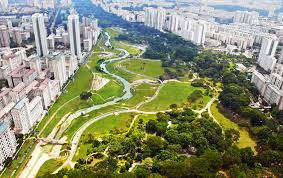The Importance of Sustainable Urban Planning
Urban areas are growing at an unprecedented rate, leading to various environmental and social challenges. Sustainable urban planning plays a crucial role in addressing these issues and creating cities that are liveable, resilient, and environmentally friendly.
Environmental Benefits
Sustainable urban planning focuses on reducing carbon emissions, promoting green spaces, improving air quality, and implementing energy-efficient infrastructure. By incorporating renewable energy sources, efficient public transportation systems, and green building practices, cities can significantly decrease their environmental impact.
Social Equity
Equitable access to housing, healthcare, education, and job opportunities is essential for creating inclusive cities. Sustainable urban planning aims to design neighbourhoods that are accessible to all residents, regardless of their socio-economic background. This can help reduce inequalities and enhance the overall quality of life for urban dwellers.
Resilience to Climate Change
As climate change continues to pose threats such as extreme weather events and rising sea levels, cities need to be prepared to adapt. Sustainable urban planning involves designing infrastructure that can withstand climate-related challenges while also mitigating their impact. Green roofs, permeable pavements, and flood-resistant buildings are just a few examples of resilient urban design practices.
Economic Advantages
Sustainable urban planning can lead to long-term cost savings by reducing energy consumption, minimising waste generation, and enhancing overall efficiency. Additionally, green initiatives such as bike lanes, pedestrian-friendly streetscapes, and mixed-use developments can attract investment and boost local economies.
Conclusion
In conclusion, sustainable urban planning is essential for creating cities that are environmentally sustainable, socially inclusive, resilient to climate change, and economically viable. By prioritising sustainability in urban development projects, we can build a better future for current and future generations.
Understanding Sustainable Urban Planning: Key Concepts and Solutions
- What is meant by urban sustainability?
- What is the concept of sustainable urban planning?
- What is the meaning of sustainable urbanization?
- What are the sustainable solutions for urban planning?
What is meant by urban sustainability?
Urban sustainability refers to the concept of developing cities in a way that meets the needs of the present generation without compromising the ability of future generations to meet their own needs. It involves creating urban environments that are environmentally responsible, socially inclusive, economically viable, and resilient to climate change. Urban sustainability encompasses various aspects such as efficient resource use, green infrastructure, equitable access to services, and community engagement. By prioritising urban sustainability in planning and development processes, cities can strive towards a more liveable and sustainable future for all residents.
What is the concept of sustainable urban planning?
The concept of sustainable urban planning revolves around developing cities in a way that balances environmental, social, and economic considerations to create long-term viability. It involves designing urban spaces that minimise carbon emissions, promote green infrastructure, enhance community well-being, and support economic growth while preserving natural resources for future generations. Sustainable urban planning aims to create cities that are resilient to climate change, inclusive for all residents, and efficient in their use of resources. By integrating principles of sustainability into urban development strategies, sustainable urban planning seeks to build thriving and liveable cities that prioritise the well-being of both people and the planet.
What is the meaning of sustainable urbanization?
Sustainable urbanization refers to the process of planning, designing, and developing cities in a way that meets the needs of the present without compromising the ability of future generations to meet their own needs. It involves creating urban environments that are environmentally friendly, socially inclusive, economically viable, and resilient to climate change. Sustainable urbanization aims to balance economic growth with environmental protection, promote equitable access to resources and opportunities for all residents, and ensure that cities can adapt to evolving challenges while maintaining a high quality of life for their inhabitants.
What are the sustainable solutions for urban planning?
When considering sustainable solutions for urban planning, several key strategies come to the forefront. Implementing compact city designs that promote mixed land use can reduce the need for extensive transportation, thus lowering carbon emissions. Integrating green spaces and urban forests not only enhances the aesthetic appeal of cities but also improves air quality and provides habitats for biodiversity. Embracing renewable energy sources, such as solar panels and wind turbines, can help cities transition towards a low-carbon future. Additionally, investing in efficient public transportation systems and promoting pedestrian and cycling infrastructure can reduce reliance on private vehicles, easing traffic congestion and improving overall urban mobility. By incorporating these sustainable solutions into urban planning initiatives, cities can create more liveable environments that benefit both residents and the planet.

